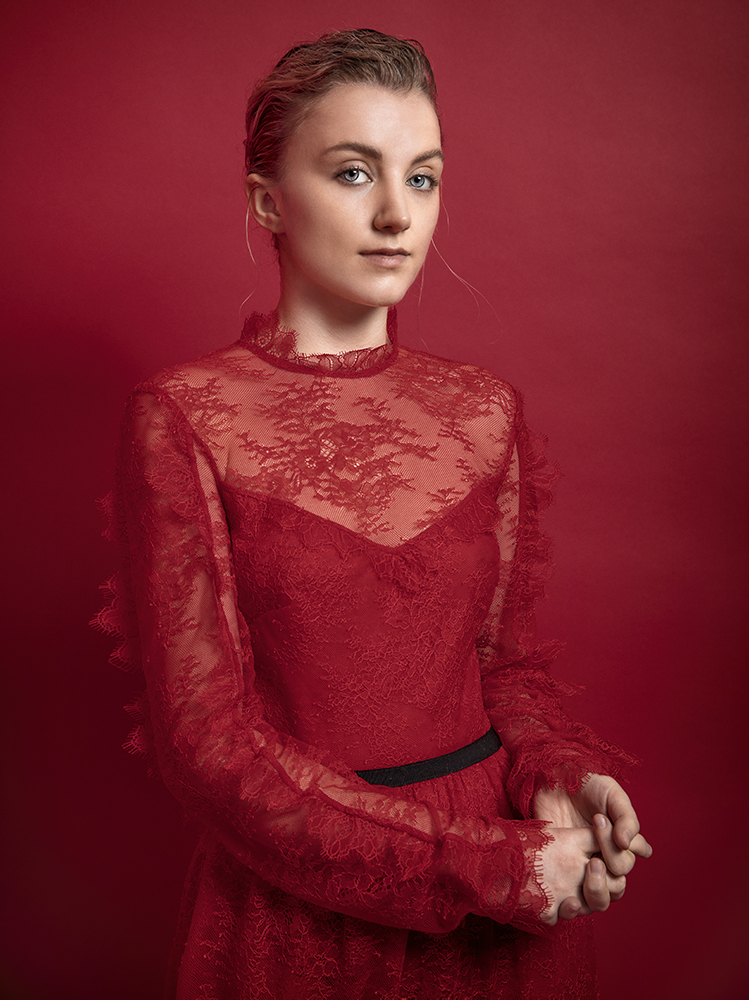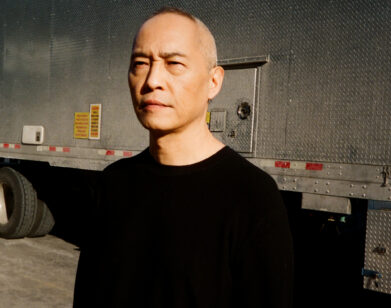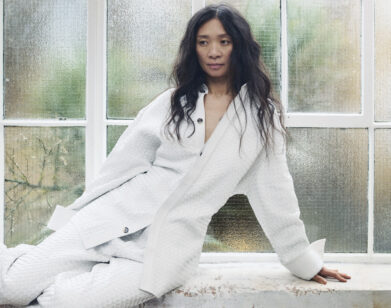Evanna Lynch
EVANNA LYNCH AT BIG SKY STUDIOS IN LONDON, FEBRUARY 2017. PHOTOS: IAKOVOS KALAITZAKIS. STYLING: THOMAS DAVIS. HAIR: THOMAS SILVERMAN. MAKEUP: PABLO RODRIGUEZ/CLM USING M.A.C. COSMETICS
Evanna Lynch entered the film industry under exceptional circumstances. While in her mid-teens, the Irish actor won the role of Luna Lovegood in the last four Harry Potter films through an open audition. “It took me a while to feel like I was cool enough to be friends with [the other kids on set],” she says with a laugh. “I had a chaperone. Everyone else had their parents, and their parents would let them be, but I had this crazy, strict chaperone. She was not allowed to let me out of her sight for all the time she was supervising me, so she didn’t…I always felt embarrassed,” she continues.
Now 25, Lynch is currently promoting her latest film, the Irish indie My Name Is Emily, in which she stars as the titular character. Following the death of her mother and the institutionalization of her father, Emily, a young girl living in foster care, embarks on a road trip with her classmate Arden. Together, they hope to reunite Emily with her sole surviving parent.
Filmed over the course of six weeks, My Name is Emily is the first feature from writer-director Simon Fitzmaurice. After premiering his second short, The Sound of People, at the Sundance Film Festival in 2008, Fitzmaurice was diagnosed with ALS. He is now paralyzed, and wrote and directed My Name is Emily using only his eyes.
Last week, Lynch met with her close friend and former Harry Potter castmate Bonnie Wright to discuss their shared history, carrying a film for the first time, and working with Fitzmaurice.
BONNIE WRIGHT: I’m going to start with a Potter-related question. We all finished the Potter films at the same time, and in a weird way, we started our new chapters almost on the same page, but then we all went our own way. I know that the choices I’ve made have changed the course of my heart. I’m interested in the choices that have led you to where you are with your work and also within yourself, and how those choices were dictated by the experience you had just had.
EVANNA LYNCH: I always really loved acting. I did before Potter, and guess I had a pulse on the industry from working on Potter. I’d never worked beforehand, so I wasn’t really used to hustling. I wasn’t aware of that concept. [laughs] After the films, I had an agent and they were encouraging me to go to university, not to study acting. They were like, “Don’t go to drama school. You don’t need to do that.” In retrospect, I really wish they had urged me to go. Then I got frustrated: “I know I want to act, what’s the point in spending so much time at university?” It was like I was holding something back. My siblings all switched university courses so many times and I was like, “I actually know what I want to do, which is kind of a gift. I should keep pursuing that.” So I went to L.A. I had a manager and met a bunch of people who were very encouraging about L.A.—they were like, “That’s where everyone gets a shot. It’s not as exclusive as London.” I intended to go for three months and I just kept staying. I really liked the community of artists, which was so different to Ireland. In Ireland, they kind of have this attitude that you’re lucky to get into the industry, or that you have notions about yourself. I really liked that L.A. was more if you work hard, you can get to wherever you want to.
WRIGHT: Did you feel like being in a new city you were able to create a new identity for yourself that maybe so far had been defined by being in these films? Did find that you had another chance to just be you, or did you feel like you carried that story for a while?
LYNCH: I always get asked that question: “Did Harry Potter hold your back? Was it a help or a hindrance?” And I always feel like it’s been a help—it’s up to me to redefine it. Sure, casting directors have preconceptions, but it does open doors, it is a big name. I wasn’t the kind of ballsy actress who just wanted people to know me, so I think having that history and that backing was helpful. In L.A., you have to be so assertive. You have to just go for things.
WRIGHT: It’s the opposite to our Irish-British mentality.
LYNCH: Yeah, that apologetic thing.
WRIGHT: I wouldn’t have fallen in love with filmmaking if it weren’t for that experience. I think it’s always respecting that experience and then, “Okay, what am I going to do with that for good? For other people and for myself?”
LYNCH: I certainly felt disillusioned for a while after—probably for one to two years after finishing filming—when I realized that everything isn’t so well-written. I was auditioning for so many pilots and I was like, “I wouldn’t even want to watch these things.” I started feeling if I hadn’t had Potter, if I had pulled my way to the top in a different way, I think I would have had an appreciation for really good writing.
WRIGHT: You realize and respect the importance of good writing. Having now gone to the more practical side of filmmaking and directing, I’m so pleased that everyone who we worked with, through all departments, was just amazing at their craft. I therefore had such great respect and a belief that you have to have integrity, even in a world that is essentially a business. I think it’s really important to have a taste for the material and the collaborators—you want them to really be invested in the film industry first through a creative reason.
LYNCH: But I didn’t realize that when I started new projects—that people would say things and would not back them up. [laughs] People have great big ideas, but they wouldn’t have the experience. I hadn’t really realized that Jo [Rowling] had done so much of the work for us. I could just step into the role and the whole backstory is there, all the details just fit.
WRIGHT: But does that then ask more of us from an acting perspective?
LYNCH: It does. And that’s what’s exciting about going into independent films—there aren’t that many people looking after you. You do really have to build the role, to be more of the author. I felt like on Potter I was more of an interpreter.
WRIGHT: After those few years, what non-negotiable things did you set yourself as an actor choosing material? For instance, with My Name is Emily, what was it within the script that stood out compared to maybe some other things you’d been reading that seemed a bit two-dimensional?
LYNCH: Maybe I am a lazy actor. [laughs] Maybe it is still the writing. Simon [Fitzmaurice]’s writing is so beautiful. It was so poetic and thought-provoking. I think there are a lot of writers that can get away with not being gifted with words. I’ve done a few writing classes in L.A. and they are very focused on the plot and the structure and all that.
WRIGHT: It’s funny. Drawing on the experience I have of now directing, to me, my one strength that I know is my ability to communicate with actors and therefore make characters really important. I know I can fall down on plots and events because most films I love, nothing much happens in them; it’s more a moment in time with a person, which is entirely what My Name is Emily is about.
LYNCH: I always found with [Harry Potter director] David Yates, he was so good with working with actors because he always credited us with knowing more about the character than anyone else. He never imposed any direction on me. He always questioned and questioned till you found common ground.
WRIGHT: On Harry Potter, David Yates was the fourth director to direct me in the role of Ginny, so that was always interesting as well. I also think independent films give directors more space to have an intimate relationship with an actor. With David Yates, that was just part of his way of being. Even outside of directing, he’s very one-on-one and very intimate during conversation, and I think that obviously really helped him, even amongst thousands of people on set.
LYNCH: After Potter, I would work with directors where I would get the roles just because of Potter, and I would have these moments where there’d be a miscommunication and I would have this, “Am I a terrible actor?” instance. I remember I had a theater audition and the guy just didn’t even look up at me, didn’t engage. I called my acting teacher and I was like, “I can’t do this. He’s a really well-known director and I can’t connect with him.” And she was just like, “This is not your way of connecting with a person.” There are different ways of directing different actors.
WRIGHT: It’s also hard because you want to be challenged and you want each project to be different. You want to be like, “This is maybe not my first choice of communication, but what do we agree on and where can the through-line of collaboration work?” Sometimes it just doesn’t work and you don’t enjoy the experience, and I think that essentially has to happen. Films can’t be made without one another—you’ve got to be a team player; you’ve got to be a collaborator. I think sometimes people are actually purposely using that to get you into an emotional state for the character—manipulating and bullying the actors to get some emotional performance out of them. It wouldn’t be something that I would at all like to be or work with, but then there is a manipulation of self. I think it’s interesting when you do have to let go of who you are as a person when you act. I found that really challenging when I was auditioning because I was at an age when I was still figuring out who I was. I found it really difficult to leave Bonnie outside of an audition room. That’s why I found directing, for me, to be a better form of therapy than maybe acting: how do we write characters or choose characters as a process of figuring out ourselves?
[In the film,] I was really interested in the relationship that Emily has with her father and I was wondering if the process that she goes through resonated with you at all? This idea that we have our parents on this pedestal—we only see them as our mum and our dad—but there is a point when we learn more about them as individuals and we begin to see both their beauties and their flaws. I guess Emily’s father does betray her—he’s not there for her as a father, literally, physically. To her understanding, he isn’t able to be there for her because of his mental health, [but] she then realizes that actually it was his choice, and he could have been there for her. What do you think in that moment—because I found it such a beautiful moment between the two characters—enabled her to quite quickly and gracefully forgive him? What is he betraying her through and how do you think she comes quite quickly to that forgiveness?
LYNCH: What angers her the whole film, the whole time that she spends away from him, is that he is locking her out; she has no idea what he’s going through. I guess why she gets so angry when she actually realizes he chose to cut her out is because all of her life, he treated her as an adult. He’s been talking about these really complex philosophical concepts with her and trusting her with those, and that’s how she’s been brought up. There’s no line between her being a child and being an adult. And then he suddenly stops letting her into that, and I think she just feels so betrayed. All she wants is truth. She feels so disrespected and so abandoned that he won’t let her into his pain that they actually are sharing—they both went through this experience and he just fails. I think the reason she’s able to handle it is because she knows him and he shows his vulnerability, which is all she wanted. She’s not expecting him to be perfect. I don’t think she’s that naïve. I think they had more of a friendship. They had a kinship. She was like his intellectual landing board. Just him coming to her and saying, “I’m sorry, I’m broken. I don’t know what to do. I don’t know my way out of this.” That’s all she needed to be let back in so they can go through it together.
WRIGHT: I think that is an interesting thing. As an intellectual, like you say, he shares all his ideas with her and really respects her and doesn’t see her as a stereotypical child. However, in a way, all she really wanted to be at times was a child. Through that moment of grieving, she almost has to grow up too fast.
LYNCH: She just wanted to be supported and loved. It was not the mother’s death, but it was everything that came because he wasn’t admitting his actual grief and pain. He was pretending that it was all okay and that it could all be explained—death could be explained.
WRIGHT: Going back to the difference between independent films and large studio productions, did you find being on this film that you were able to really create a different kind of intimacy amongst the cast and crew, and how did that elevate the process for you? Or were there elements of it that you really missed from the scale of filming Harry Potter?
LYNCH: There are pros and cons to both. I feel like the main difference for an actor between studio and independent films are the opportunities to fuck up. I always felt like on Potter, there were so many people looking out for you—tweaking your wardrobe and your hair and correcting you—that you couldn’t mess up. The end result was cool and the magic is awesome, but you’re very much aware that a lot of people went into the performance. When I first started doing independent films, it was thrilling that I had to fight for myself more, that I could actually mess up. It was more stressful, but it was more rewarding artistically. Also, [on Potter] we had the luxury of time. I really missed that about studio films. I’d mess up and be like, “What? We can’t just do another one? Just one more?” And they were like “Nope! Moving on!” You have to be looking at your performance and you have to really trust the director.
WRIGHT: When you’re doing a film on the scale of Harry Potter, you’re putting trust in multiple things—in the producers, the cast and crew that you’ve been working with for ages, the script that you already trust because you love the books. If something does end up not being great, they’ll just reshoot it, whereas with independent filmmakers, you are putting so much trust in your director and your fellow actors. This, essentially, is your film—was there a lot of freedom that you felt you had to bring to Emily?
LYNCH: It was such a great part. I’ve not had that many parts where you read it and it feels like they’re words that would come out of your mouth. It’s just so natural. There are some scripts I have to work a lot harder to get certain words to feel natural. With her, I knew what she was saying—it just was in me or something. But Simon very much wanted to talk about it. He communicates through writing emails best, so that’s truly how he got to know her. It was like we were both obsessed with her.
Because of Simon’s condition, there’s a lot of silence; you’re just sitting, waiting for the answer. I realized in those moments how insecure I was about acting, about personal things.
WRIGHT: The idea of language as well … say you’re working with an Italian director and everything you said had to be translated. It’s interesting how much language we use in between takes and how succinct we become in explaining where you’re trying to get to.
LYNCH: Yeah, we became more in sync and I got to trust him more and stopped needing his approval so much. I realized that that’s more exciting as an actor, to just make choices. With Simon as well, the thing you have to quickly realize is that he doesn’t have time to be careful with his words. He was direct, and sometimes my feelings would get hurt, [but] it’s more empowering if someone just says what they feel, and I think that comes across in Emily’s character. I love that line, “Why do we smile in pictures? Why is there always this pressure to be happy?” He doesn’t have time for that; to actually communicate himself and his truth, he has to say what exactly what he feels.
MY NAME IS EMILY IS OUT NOW IN SELECT CITIES AND WILL BE AVAILABLE VIA VoD FROM FEBRUARY 24, 2017.







